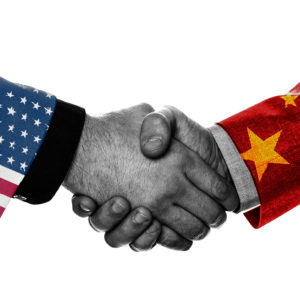U.S. relations with China are going from bad to worse at a dizzying pace. That’s not to say war is about to break out at any of the obvious flashpoints, from the South China Sea to Taiwan to the Korean peninsula, but the signs of impending conflict are clear.
Most dramatically, China has been intimidating Taiwan, and indirectly the U.S., by flying dozens of fighter planes into Taiwan’s air defense identification zone. That may not be as frightening as it sounds. These planes are not buzzing the island state, which China has been claiming as its own ever since the Communist victory over the mainland in 1949, and Taiwan isn’t rising to the challenge by threatening to shoot any of them down. Still, while two U.S. aircraft carriers and one British carrier plus a Japanese helicopter carrier were churning the waters off nearby Okinawa, Japan’s southernmost island prefecture, you have to believe this show of military force on all sides is alarming, to say the least.
Add the U.S.-China trade imbroglio to this military confrontation, and you have an admixture that could explode any time someone tosses in a lighted match. No, that’s not too likely, not right now, but consider some of the remarks of U.S. Trade Representative Katherine Tai at the influential Center for Strategic and International Studies in Washington. In carefully phrased opening verbiage, she accused Beijing of having “doubled-down on its state-centered economic system” while failing to engage in “meaningful reforms” that might address U.S. concerns.
Tai did not get into nitty-gritty specifics but did cite China’s enormous success in taking over much of the global steel industry, and other sectors too, by what she plainly saw as highly unfair practices. Ever diplomatic, she did say she hoped to have “frank conversations” with the Chinese about these tendentious issues, but we all know, when senior U.S. officials talk that way, they’re not getting anywhere.
Amid all the pointed questions, one topic Tai did not address was the deal in which the Huawei executive, Meng Wanzhou, daughter of the giant company’s founder, got off the hook in Vancouver last month when the U.S. agreed to stop calling for her extradition from Canada to face charges in the U.S. of fraud and violation of sanctions against Iran. Meng did admit to some wrongdoing, but the U.S. did not want to press what could have spiraled into an even greater U.S.-China shouting match.
The really good news about the deal was that two Canadians were freed after nearly three years behind bars in China on trumped-up if not totally false charges of dealing in Chinese state secrets. One of them, Michael Spavor, was well known among journalists for running tours into North Korea from his base in the bustling Chinese city of Dandong, across the Yalu or Amnok River from the North Korean city of Sinuiju. The other, Michael Kovrig, was a former Canadian diplomat to whom Spavor was alleged to have passed on sensitive photos.
The many journalists who knew Spavor were delighted and relieved when he and Kovrig, “the two Michaels,” were freed. But the case raises troubling questions. In the future, when prosecutors in foreign countries go after officials with Chinese companies or agencies for any of the many offenses of which they are suspected, ranging from economic crimes to espionage, will Chinese authorities then arrest citizens of those countries and hold them as pawns?
The Chinese claim there was no connection between the return home of Meng, who’d been free in Vancouver on $8 million bail while having to wear an ankle bracelet and return to her luxury home every night, and the release of Spavor and Kovrig, who suffered far worse in a Chinese prison. They were, of course, pawns in a much larger game.
As the economic war between the U.S. and China intensifies, we may well see more such cases in which the Chinese hold hostages. That’s not to suggest that U.S. and Canadian authorities should not have negotiated for the exchange, but China’s success in springing Meng sets a precedent.
Tai undoubtedly could name other Chinese companies that are just as culpable as Huawei. Now the Chinese are all the more likely to hold innocent people for ransom. Anyone could be seized while the Chinese brandish weapons against Taiwan in a war of nerves in which foreigners in China, doing business with Chinese companies, are at risk.

